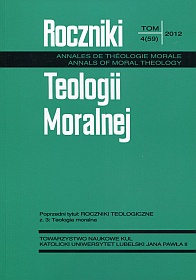The Person or the Information - a Personalistic Polemics With the Paradigm of Information-Based Society
Abstract
For numerous reasons, postmodernism does not uphold the classical holistic conception of reflecting upon the human being. Thus, the problems related to the social realm − as the ones that concern groups of people – are entirely delegated to the domain of sociological studies. In consequence, this approach is devoid of the anthropological foundations of the reflection on the social human being. Sociological research often suffers from prosopoic blindess: the failure to anchor its research in philosophical and personalistic grounds.
The present paper attempts to illustrate this prosopoic blindness through the analysis of the theory of information-based society. To do that, the authors start with presenting the conception of the human being as a person, developed by the thinkers related to the Lublin School of Personalism. Next, the effects of the above-mentioned prosopoic blindness are presented. The first is the degradation of the human being as a personal being by granting the absolute ontological status – if not divine, in fact − to information (or, alternatively, to the access to information). Modes of communication become more important than the personal self-realization of the interlocutors − which should always be seen as the major objective of human dialogue.
References
Sobór Watykański II. Konstytucja duszpasterska o Kościele w świecie współczesnym Gaudium et spes. W: Sobór Watykański II. Konstytucje, dekrety, deklaraje. Poznań 2002 s.526-606.
JanPaweł II: Encyklika Redemptor hominis. Watykan 1979.
JanPaweł II: Encyklika Veritatis splendor. Watykan 1993.
JanPaweł II: Encyklika Evangeliom vitae. Watykan 1995.
Bartnik Cz. S.: Osoba ludzka – jej wymiar społeczny i transcendentny. „Ethos” 18:2005 nr 1-2 s. 41-49.
Bartnik Cz. S.: Personalizm. Lublin 2008.
Bendyk E.: Antymatrix. Człowiek w labiryncie sieci. Warszawa 2004.
Castells M.: Galaktyka Internetu. Tł. T. Hornowski. Poznań 2003.
Castells M.: Siła tożsamości. Tł. S. Szymański. Warszawa 2009.
Castells M.: Społeczeństwo sieci. Tł. M. Marody, K. Pawluś i in. Warszawa 2008.
Castells M.: Koniec Tysiąclecia. Tł. J. Stawiński, S. Szymański. Warszawa 2009.
Floridi L.: Zagadnienie moralności informacji. O filozoficznym ugruntowaniu etyki komputerowej. „Ethos” 18:2005 nr 1-2 s. 269-307.
Freeman Ch.: Technical Change and Economic Theory. London 1988.
Gissens A.: Nowoczesność i tożsamość. „Ja” i społeczeństwo w epoce późnej nowoczesności. Tł. A. Szulżycka. Warszawa 2002.
Iłowiecki M.: Człowiek na smyczy. Manipulacje osobą ludzką w społeczeństwie informacyjnym. „Ethos” 18:2005 nr 1-2 s. 117-134.
Jędraszewski M.: Społeczeństwo informacji społeczeństwem spotkania osób? „Ethos” 18:2005 nr 1-2 s. 143-162.
Koszowy M.: Informacja – prawda – społeczeństwo. Próba uporządkowania problematyki. „Ethos” 18:2005 nr 1-2 s. 65-76.
Krajewski K.: Osobowa podmiotowość i wspólnota a społeczeństwo informacyjne. „Ethos” 18:2005 nr 1-2 s. 50-62.
Krąpiec M. A.: Człowiek jako byt osobowy. „Ethos” 18:2005 nr 1-2 s.23-35.
Krąpiec M. A.: Człowiek w kulturze. Dzieła T. XIX. Lublin 1999.
Krąpiec M. A.: Ja – człowiek. Lublin 2005.
Krzysztofek K.: Szanse społeczeństw przedinformacyjnych. W: Społeczeństwo informacyjne. Aspekty techniczne, społeczne i polityczne. Lublin−Warszawa 1992 s. 257-277.
Lekka - Kowalik A., Lizut R.: Aksjologiczny fundament społeczeństwa informacyjnego. „Ethos” 18:2005 nr 1-2 s. 255-268.
Mikułowski Pomorski J.: Kultura wobec społeczeństwa sieci. W: Społeczeństwo informatyczne: szansa czy zagrożenie? Red. B. Chyrowicz. Lublin 2003 s. 37-70.
Stępień A. B.: Studia i szkice filozoficzne. T. 1. Lublin 1999.
Wojtyła K.: Miłość i odpowiedzialność. Red. T. Styczeń. Lublin 2001.
Wojtyła K.: Osoba i czyn oraz inne studia antropologiczne. Red. T. Styczeń. Lublin 2000.
Zalewski Z.: Dlaczego nie powinniśmy się obawiać społeczeństwa informacyjnego? W: Społeczeństwo informatyczne: szansa czy zagrożenie? Red. B. Chyrowicz. Lublin 2003 s.103-114.

